| When India And Pakistan Battled For First Place In Tokyo |
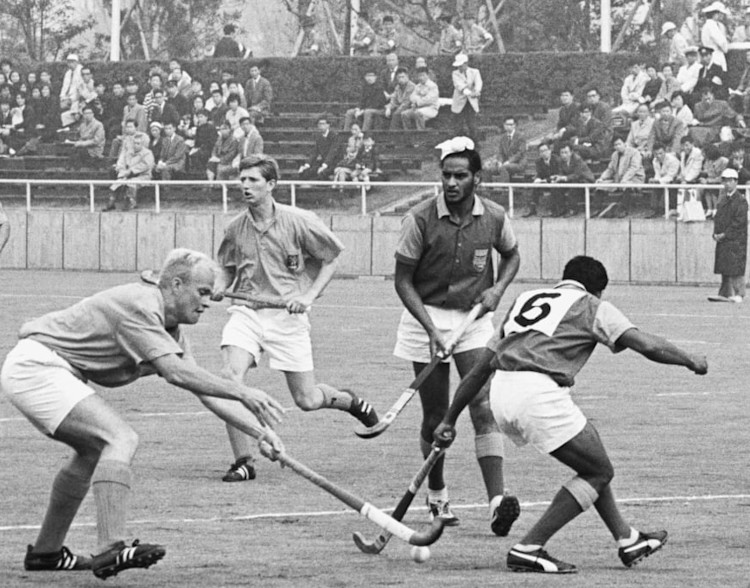
Article by Naveen Peter,
Article and Photograph courtesy Olympic
Channel
Kenyan team in photo - Avtar Singh Sohal (captain) and no. 6 Silu Fernandes
 he selection of the
Indian hockey team for the 1964 Olympics began with the national
championship in New Delhi. After the nationals, as many as 77 players were shortlisted for a
month-long camp in Jalandhar under coach Habul Mukherjee. he selection of the
Indian hockey team for the 1964 Olympics began with the national
championship in New Delhi. After the nationals, as many as 77 players were shortlisted for a
month-long camp in Jalandhar under coach Habul Mukherjee.
Harbinder Singh, the former Indian forward, said. "The initial
group of 77 was first reduced to 55, and then to 36. The final squad of 18
was to be decided after a three-day selection trial. Such was the
competition that it had to go into the fourth day before the team was
finalised."
Moreover, with no major disagreements within the team and
regionalism yet to creep into the setup, the Indian hockey team for
Tokyo 1964 was a strongly-knit unit. India's convincing wins in its preparatory tours to New
Zealand and Malaysia ahead of the Tokyo Olympics, which were being held in Asia for
the first time, gave the side enough confidence heading into the Games.
Led by captain Charanjit Singh, India won 2-0 against Belgium in the
opening group match. This was followed by Indian hockey's first-ever draw at the
Olympic Games, a 1-1 tie against Germany. The Indian hockey team trailed
Germany from the
20th minute, and even stared at a rare possibility of a group-stage
defeat. But Prithipal Singh, who impressed many at his debut four
years ago at the Rome Olympics, ensured that India pulled one back from a penalty
corner.
That draw was followed by another 1-1 result against Spain,
before India got into their groove and recorded four consecutive wins to
make it to the semi-finals as the pool toppers. Defender Prithipal
Singh was in top form, netting 11 goals, and the forward line of
Harbinder Singh and Joginder Singh proved to be a terror for the
opposition defence.
Incessant rain in the semi-finals didn't slow them
down either as India beat Australia 3-1 in slushy underfoot conditions.
It meant that the Indian hockey team now had a chance to win back their
Olympic title. And once again standing in their way, for the third
consecutive Olympic final, was Pakistan.
India vs. Pakistan is a match that hockey fans across the world crave
for. The matches are largely free-flowing and a delight to watch. But the Olympic final
at Komazawa Hockey Field was very different.
"Relations between the two
teams were not very cordial. We were not on talking terms. Against
India, Pakistan employed a very rough game," explained Harbinder Singh.
At one point, the match got so rough that the umpire had
to intervene and line up both the teams, telling the players to 'behave' themselves.
After a goalless first-half, India were rewarded with a penalty corner five minutes after
half-time. Prithipal Singh drove in with a fierce hit from the
top of the striking circle. His shot struck Pakistani captain Manzoor
Hussain's foot on the goal line, handing India a penalty stroke.
Mohinder Lal made no mistake from the spot to hand India the lead.
Defending champions Pakistan came back roaring and
created many scoring opportunities in order to tie the game. However, standing like a rock was
Indian goalkeeper Shankar Lakshman, who blocked their every move. The shot-stopper from Mhow - a cantonment
area in Indore in the state of
Madhya Pradesh - pulled out two brilliant saves in the goal from Munir Dar's short
corners, as India held on to the slender lead to regain the Olympic
hockey title.
The victorious Indian team celebrated with a traditional bhangra
dance once they sealed the gold medal. Shankar Lakshman ended with the Man-of-the-Match
award. India had played 9 matches in 12 days in Tokyo - winning seven and drawing two.
As India prepares to return to Tokyo for
another Olympic adventure next year, the memories of the 1964 Games will
be a guiding force for the team.
|
| When India And Pakistan Battled For Last Place In London |
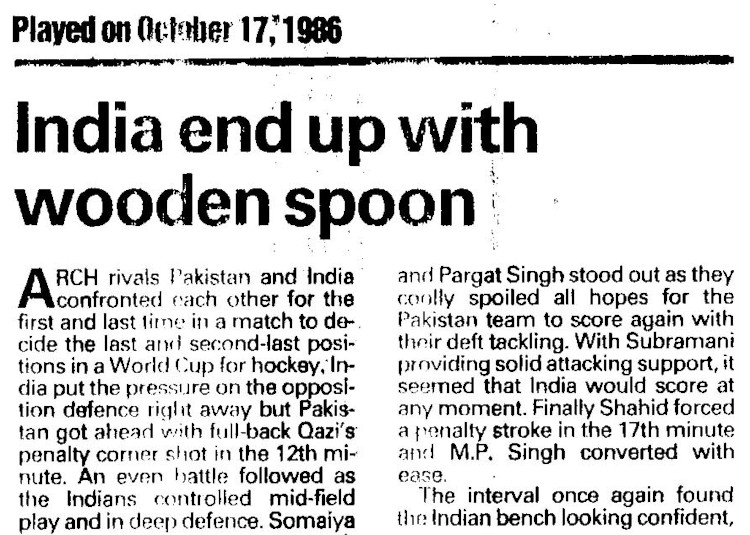
Based on Article and Newspaper Clipping from Stick2Hockey.com
 t
seemed to be a leaf straight out of Ripley's Believe It or Not. The
stage was the 6th World Cup at Willesden, England, the first hockey World Cup
to be staged on an artificial surface. t
seemed to be a leaf straight out of Ripley's Believe It or Not. The
stage was the 6th World Cup at Willesden, England, the first hockey World Cup
to be staged on an artificial surface.
Eight-time Olympic champions India vs. three-time Olympic champions
Pakistan, with the prior two Olympics (1980, 1984) being won by these
two countries. One-time world champion India vs. three-time world
champions Pakistan, with the prior three World Cups (1975, 1978, 1982)
being won by these two countries.
India and Pakistan, who had played for the Olympic gold on three
occasions, and for the World title once, were now battling for 11th vs.
12 place, and to avoid the ignominy of being left holding the wooden
spoon. This unthinkable and shocking matchup for last place happened on
October 17, 34 years ago.
In the lead up to the World Cup, what pushed India and Pakistan to
the brink was the scheduling of the Asian Games immediately prior to the
tournament. The 1986 Asian Games final took place on September 29 in
Seoul, and the World Cup started on October 4 - less than a week after
an exacting and demanding continental championship.
Both nations alighted in London reeling from fatigue and benumbed by
defeat. While Pakistan struggled to come to terms with a 1-2 defeat to the
new force South Korea in the Asian Games hockey final, India had
missed the Asian Games hockey final for the first time in history.
Not surprisingly, Pakistan began their World Cup campaign disastrously, losing
to Argentina 1-3. India played the next day and lost to Poland 0-1.
Further defeats followed: Pakistan went down to The Netherlands 1-2,
and India to Spain (1-2) and Australia (0-6).
Pakistan appeared to effect a turnaround in fortunes with a
sensational 5-3 victory over New Zealand, after having trailed 2-3 with just
minutes to go. India gained some solace with a 2-0 win over Canada.
But it all fell apart for Pakistan when they lost 1-3 to England
and crashed out of the semi-final race. This was
followed by another defeat for the Green Shirts, when the Soviet Union
(who finished fourth) beat them 2-0.
India forced a creditable 2-2 draw with West Germany (eventual bronze
medallists), but were already out of the race by then.
In the playoffs for the lower placings, further setbacks awaited the
once invincible Asians giants. Pakistan lost to Canada 1-2 in the
classification crossover and India came up croppers against New Zealand
by the same score to set up an incredulous match. In the battle for the
wooden spoon, Pakistan won 3-2 in extra-time to leave India at the
bottom of the heap. Australia went on to win the 1986 World Cup, while
the losing finalist England formed the nucleus of a Great Britain side
which won the 1988 Olympic gold.
Since that dreadful day, there have been similar or worse disasters
for the Asian giants. Pakistan finished last at the 2010 New Delhi World
Cup, and India finished last at the 2012 London Olympics. India failed
to qualify for the 2008 Beijing Olympics, while Pakistan failed to
qualify for the 2016 Rio Olympics, the 2020 Tokyo Olympics (postponed
to 2021), and the 2014 World Cup in The Hague. But it was on that
October day in 1986, when the hockey world got churned!
|
| 5th Death Anniversary Of Former IHF Chief Ashwini Kumar |
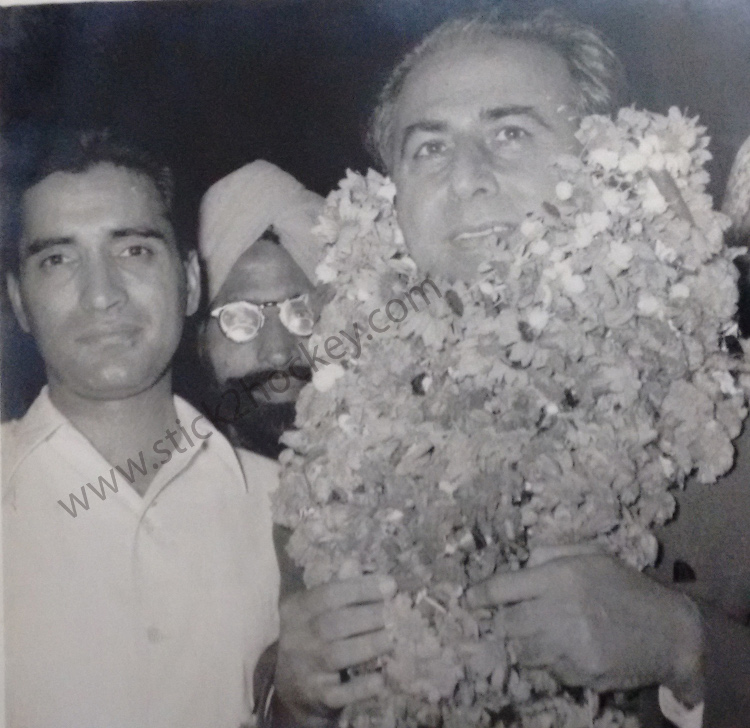
Article by K. Arumugam , Article and Photo
credit Stick2Hockey.com
Ashwini Kumar (left) succeeded Naval Tata (right) as the IHF Chief
 ctober
19th marks the fifth death anniversary of Ashwini Kumar, one of the
finest sports administrators that India has produced. He was not only
passionate about hockey, but later evolved to become the reliable deputy
of Juan Antonio Samaranch, the longest serving president of the
International Olympic Committee (IOC), thus carving for himself a niche
in the global Olympic movement. ctober
19th marks the fifth death anniversary of Ashwini Kumar, one of the
finest sports administrators that India has produced. He was not only
passionate about hockey, but later evolved to become the reliable deputy
of Juan Antonio Samaranch, the longest serving president of the
International Olympic Committee (IOC), thus carving for himself a niche
in the global Olympic movement.
Ashwini Kumar was a multi-faceted personality - he was a connoisseur
in diverse fields such as music, sports and literature. He was an
excellent orator, prolific writer and expert on Indian philosophy. His
contributions in all the fields he was involved with, like the IOC,
Indian Olympic Association (IOA), music, literature, police service,
etc., are legendary.
He is known in India as the most-debated - though he should have been
the most admired - president of the Indian Hockey Federation (IHF). For
many of his era, he was veritably Mr. Hockey in India. A decorated
Imperial Police Officer, his first love, of course, was hockey, so much so
he even named his first child Hockey.
Ashwini Kumar took over the IHF mantle in 1958, a couple of months
before hockey was played for the first time in the Asian Games that
year. India lost the Asian Games hockey title to Pakistan on goal aggregate,
and the young Inspector General faced the ire of the nation. Then came the
Rome disaster, where yet again India lost to Pakistan in the 1960 Olympic final.
Ashwink Kumar organised at least 12 test series in India to boost the morale of
the team, in order to prepare for Indian hockey's resurrection. India
went on to win the title at the 1964 Olympics and the 1966 Asian Games, the
latter without conceding a single goal!
His long tenure of leading the Indian hockey had its own merits and
demerits, often portrayed as controversial. India winning 'just' bronze
in two successive Olympics - 1968 and 1972 - was the main reason for him
getting negative press. Those 'failures' were often attributed to
his 'whimsical' team selection. He faced a severe challenge to his
chair when one of the top businessmen of the times, M. A. M. Ramaswamy, entered
the ring to contest the elections for IHF chief.
The Federation International de Hockey (FIH) obviously reposed faith
in the emerging leadership than on its own vice-president! It was in that
phase one day that the then Prime Minister Smt Indira Gandhi asked Ashwini Kumar to
relinquish the IHF post in 1975. His long 17-year reign came to an end a
couple of months before India won the Kuala Lumpur World Cup.
Ashwini Kumar then turned his eyes to the IOC - he had been the
driving force behind Raja Bhalindra Singh, the ruling deity of
the Indian Olympic Association (IOA) for decades. He became IOA
Secretary for many spells.
Controversial or not, his persona and dynamism did much to
steady Indian hockey's flight through a very turbulent period.
Ashwini Kumar died in New Delhi at his Friends Colony residence
on 19th October, 2015.
|
| The Stellar Role Of The Army Sports Control Board In Indian Hockey |
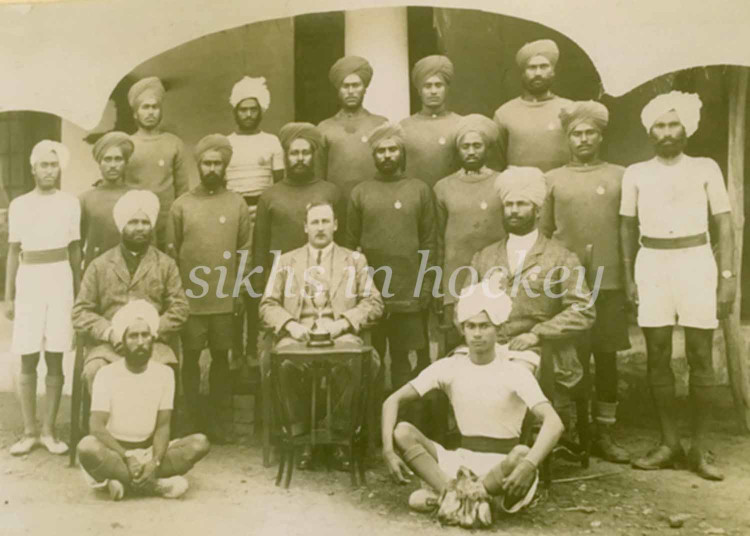
Ambala Brigade Inter-Unit Sports Day, 1919
Article by historian
Diljit Singh Bahra, photograph Edward Ricketts family collection
 he
Indian army's hockey teams have been prominent on the national scene as
far as one can remember, be it the National Championship or a plethora
of All India tournaments where their units have been regular on the podium. he
Indian army's hockey teams have been prominent on the national scene as
far as one can remember, be it the National Championship or a plethora
of All India tournaments where their units have been regular on the podium.
The most illustrious army exponent to wield the stick was The Wizard,
Dhyan Chand, doing so while rising from the rank of Sepoy to Major, and, in his wake
propagating the Indian hockey magic that was to take the world by storm.
During the British era itself, hockey was a very popular sport in the
army. Some 130 regiments, some fielding two or three teams, played
hockey with much enthusiasm and vigour.
Army Sports Control Board (ASCB) India was formed in March
1919, in line with the Army Sports Control Board in Aldershot, UK. Its
purpose was to promote and supervise sports in the army in India, and
co-ordinate sports with civilian sides. Soldiers
could play in the civilian tournaments under the aegis of the local
association, and also play for their army regimental teams under
ASCB jurisdiction.
In 1922, the post of Inspector of Physical Training
was instituted. The post holder also became ASCB's
honorary secretary. An All-India central school of physical
training was established. It had two locations, one in Ambala during
winters and one in the hill station of Kasauli during summers.
Lt. Colonel Bruce Turnbull was appointed as the first Inspector of Physical
Training in 1922. He had a general interest in all
sports, but became heavily involved in Indian hockey, both military and
civil. While holding the post, Bruce Turnbull was promoted to Colonel
midway of the following year.
Major Ian Burn-Murdoch, OBE, of the 32nd Sikh Pioneers was appointed
Commandant and Superintendent of Physical Training (East) Command in
November 1923, and posted to the headquarters in Ambala in February
1924. He succeeded Col. Bruce Turnbull as President of Indian Hockey
Federation, and was largely responsible for selecting the team for the
Amsterdam 1928 Olympic Games.
Turnbull represented ASCB India in meetings with the civilian
associations, where he championed the need for a central association for
hockey in the country. Major Edwards Ricketts of the 23rd Sikh Pioneers
was a member of the Umpires Committee. Turnbull and Ricketts would go on
to umpire at the 1928 Amsterdam Olympic hockey tournament.
ASCB India organized the hockey tour of New
Zealand in 1926. Not many would have imagined that the tour would have
an impact on not just Indian hockey, but on the sport worldwide.
And that the expedition to the Antipodes would reveal a hockey wizard who is
revered by the sport as the best of all time.
Hockey was very popular in army circles, and was of a good standard.
However, Bruce Turnbull, who had watched, played and umpired
international level hockey in England and Scotland had said: "I know of
only one Indian who would find a place in a national side,
and he is Dhyan Chand of the 4/1st Punjab Regiment - the centre-forward
who scored over 100 goals for the Indian Army in New Zealand. His
'selling the dummy' must be the envy of many a rugger player."
There is no doubt that ASCB played a key role
in developing hockey in India, and which eventually led to the formation of the Indian
Hockey Federation. Subsequently, be it colonial India or after
Independence, the Services, which combined talents from Air Force, Navy and Army,
has shone on both the domestic
and international scene. Triple Olympians Shankar Lakshman and Haripal Singh,
winger R. S. Bhola, Balbir Singh Jr., Col. Balbir Singh, Padam Shree Ignace
Tirkey, and many more are products of the Services hockey team.
|
| Photograph of the Month |

Based on article by historian Diljit Singh Bahra, Article and Graphic courtesy
Stick2Hockey.com
 he
Photograph of the Month for November 2020 is of Jaipal Singh and
Fakhruddin Ali Ahmad. They both were students in England in the 1920s,
and were members of the All India Club that was formed for social and
sporting activities of the students. he
Photograph of the Month for November 2020 is of Jaipal Singh and
Fakhruddin Ali Ahmad. They both were students in England in the 1920s,
and were members of the All India Club that was formed for social and
sporting activities of the students.
The club's team consisted of Indian resident students at various
British universities, the bulk of them coming from Cambridge and London,
though the team included players from Manchester, Edinburgh and Oxford
as well. Jaipal Singh, a student of St. John's College at Oxford, was
the Honorary Secretary of the All India Hockey Club.
In the summer of 1925, Jaipal mooted, and then executed, the idea of
a 3-week hockey tour of the Continent. This tour, which took place from
December 17, 1925 to January 5, 1926, is believed to be the first
British hockey club ever to tour Europe.
Jaipal Singh would go on to captain India in the 1928 Amsterdam
Olympics, which started India's golden reign in Olympic hockey.
He later became a Member of Parliament in India.
Fakhruddin Ali Ahmad, who was graduating from St. Catharine's
College, Cambridge, at the time of the tour, would later become the
President of India.
A fascinating article on the first tour of Europe by a British
hockey club has been written by historian Dil Bahra, and is available
here on
Stick2Hockey.com.
|
| Money Matters |
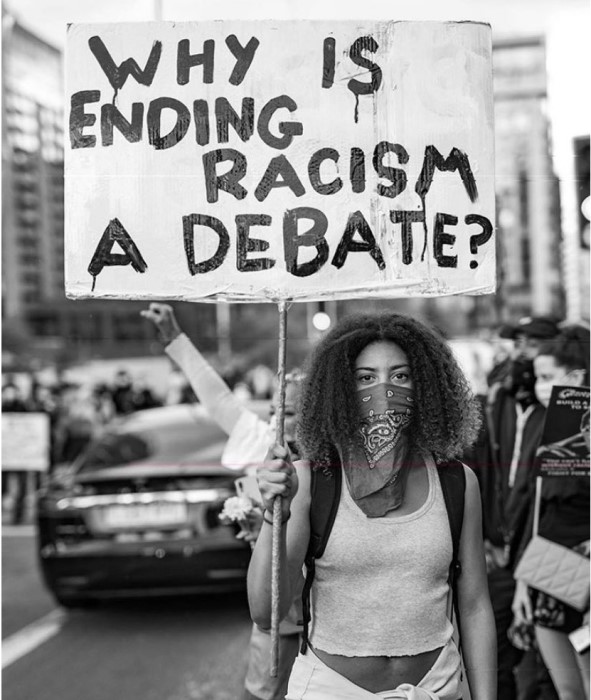
Article by Mark Brown of
The Guardian,
Photograph by Misan Harriman
 t
was one of the defining photos of this summer's civil rights protests,
and was all the more remarkable for being taken by a man who taught
himself photography on YouTube after receiving a camera from his wife on
his 39th birthday. t
was one of the defining photos of this summer's civil rights protests,
and was all the more remarkable for being taken by a man who taught
himself photography on YouTube after receiving a camera from his wife on
his 39th birthday.
This month Misan Harriman, a former City of London headhunter, became
the first black male photographer to shoot the cover of British Vogue.
Also, Sotheby's auctioned his first print, seen above, to raise money
for the Anthony Nolan blood cancer charity.
Harriman's life has been a whirlwind since he travelled to a Black
Lives Matter protest in central London in June. Near the US embassy, he
spotted 18-year-old Darcy Bourne by the side of the road with her
placard which simply said: "Why Is Ending Racism a Debate?"
He asked if she minded having her picture taken. At the same time a
protestor behind her raised a fist in solidarity. The resulting image
went viral after being shared by figures including the Vogue editor,
Edward Enninful, athlete Dina Asher-Smith, racing car driver Lewis
Hamilton, and Martin Luther King III.
Harriman, 42, told the Guardian he was drawn to the placard. "It's a
question that makes all of us reflect on why we haven't asked ourselves
this sooner?"
Bourne, an England under-21 hockey player, said she had only just
written the sign. "The paint was still wet when the photo was taken,"
she said. "I wrote that question because I'm in disbelief every day that
we still have to fight for equality, and I wanted to remind people of
the purpose of the movement."
Harriman approached Sotheby's about selling a print to raise money
for the Anthony Nolan charity, after a friend who had cancer told him
about its work. The print will be on view at Sotheby's London
headquarters from 11-14 October, while at the same time being offered at
an online auction with an estimate of £3,000 - £5,000.
Note: The print was sold for £10,062, more than double its estimated price,
in Sotheby's online auction on 14th October.
|
| Media Matters |
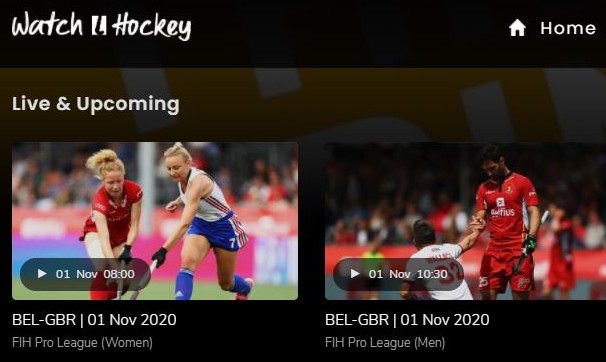
 he
International Hockey Federation (FIH) and NAGRA have collaborated to
launch the website version of Watch.Hockey (https://Watch.Hockey).
This is a follow-up product to the Watch.Hockey mobile app that was
launched in September 2020, and which garnered over 20,000 active users
in just one month. he
International Hockey Federation (FIH) and NAGRA have collaborated to
launch the website version of Watch.Hockey (https://Watch.Hockey).
This is a follow-up product to the Watch.Hockey mobile app that was
launched in September 2020, and which garnered over 20,000 active users
in just one month.
The Watch.tv website displays live matches and scores, replays,
on-demand, news, statistics and more. Using the same account as for the
mobile app, hockey fans will also see personalized recommendations such
as 'Continue Watching', 'For You' and 'What's Trending' as part of the
service.
Watch.tv is the latest product in FIH's digital "Home of Hockey"
build outs, with the aim of bringing greater visibility and growth to
the sport of hockey.
|
| Fun With Numbers |

Statistics by B. G. Joshi
 he
November 2020 edition of Fun with Numbers is on brothers who have won Olympic or World titles. he
November 2020 edition of Fun with Numbers is on brothers who have won Olympic or World titles.
- Two pairs of brothers won the gold in the 2008 Beijing Olympics
- Christopher Zeller/Phillip Zeller and Timo Wess/Benjamin Wess.
They repeated this feat in the 2012 London Olympics
- Two pairs of brothers won the gold in the 1982 Mumbai World Cup
- Samiullah Khan/Kaleemullah Khan and
Manzoor-ul-Hasan/Rashid-ul-Hasan
- Two pairs of brothers won the gold in the 2002 Cologne Champions
Trophy - Geert Jan Derikx/Rob Derikx and Ronald Brouwer/Matthijs
Brouwer. They repeated this feat in the 2003 Amsterdam Champions
Trophy
- Brothers Christopher Zeller/Phillip Zeller have won both Olympic
(2008, 2012) and World Cup (2006) titles together
| Tournament |
Country |
Player |
Player Gold Medal |
Brother |
Brother Gold Medal |
| Olympics |
India |
William Goodsir Cullen |
1928 Amsterdam |
Ernest Goodsir Cullen |
1936 Berlin |
| |
India |
Dhyan Chand |
1932 Los Angeles, 1936 Berlin |
Roop Singh |
1932 Los Angeles, 1936 Berlin |
| |
Pakistan |
Munir Dar |
1960 Rome |
Tanvir Dar |
1968 Mexico City |
| |
Germany |
Stefan Tewes |
1992 Barcelona |
Jan Peter Tewes |
1992 Barcelona |
| |
Germany |
Timo Wess |
2008 Beijing, 2012 London |
Benjamin Wess |
2008 Beijing, 2012 London |
| |
Germany |
Christopher Zeller |
2008 Beijing, 2012 London |
Phillip Zeller |
2008 Beijing, 2012 London |
| |
Argentina |
Pedro Ibarra |
2016 Rio de Janeiro |
Isodora Ibarra |
2016 Rio de Janeiro |
| World Cup |
Netherlands |
Nico Spits |
1973 Amsterdam |
Frans Spits |
1973 Amsterdam |
| |
Pakistan |
Samiullah Khan |
1982 Mumbai |
Kaleemullah Khan |
1982 Mumbai |
| |
Pakistan |
Manzoor-ul-Hasan (Sr.) |
1982 Mumbai |
Rashid-ul-Hasan |
1982 Mumbai |
| |
Germany |
Christopher Zeller |
2006 Monchengladbach |
Phillip Zeller |
2006 Monchengladbach |
| Champions Trophy |
Netherlands |
Geert Jan Derikx |
2002 Cologne, 2003 Amsterdam |
Rob Derikx |
2002 Cologne, 2003 Amsterdam |
| |
Netherlands |
Ronald Brouwer |
2002 Cologne, 2003 Amsterdam |
Matthijs Brouwer |
2002 Cologne, 2003 Amsterdam |
| |
Spain |
Ramon Alegre |
2004 Lahore |
David Alegre |
2004 Lahore |
| Tournament Mix |
Pakistan |
Khursheed Aslam |
Olympics - 1960 Rome |
Akhtar-ul-Islam |
World Cup - 1971 Barcelona |
| |
India |
V. J. Peter |
Olympics - 1964 Tokyo |
V. J. Philips |
World Cup - 1975 Kuala Lumpur |
| |
India |
Harbinder Singh |
Olympics - 1964 Tokyo |
Harjinder Singh Chimni |
World Cup - 1975 Kuala Lumpur |
|
![]()